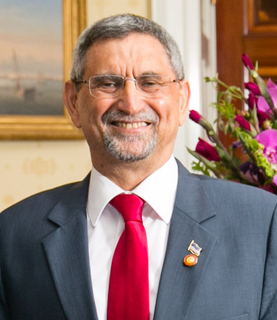
Politics of Cape Verde takes place in a framework of a semi-presidential representative democratic republic, whereby the Prime Minister of Cape Verde is the head of government and the President of the Republic of Cape Verde is the head of state, and of a multi-party system. Executive power is exercised by the President and the Government. Legislative power is vested in both the Government and the National Assembly. The Judiciary is independent of the executive and the legislature. The constitution first approved in 1980 and substantially revised in 1992 forms the basis of government organization. It declares that the government is the "organ that defines, leads, and executes the general internal and external policy of the country" and is responsible to the National Assembly.

The recorded history of Cape Verde begins with Portuguese discovery in 1456. Possible early references go back around 2000 years.

José Maria Pereira Neves is a Cape Verdean politician who was Prime Minister of Cape Verde from 2001 to 2016. He is a member of the African Party for the Independence of Cape Verde (PAICV).

The Movement for Democracy is a Christian democratic and liberal party in Cape Verde. Established in 1990, it was the ruling party from 1991 to 2001 and returned to power in the 2016 parliamentary election. Its members are nicknamed "os ventoinhas".
Cabo Verde Airlines, previously branded TACV Cabo Verde Airlines, is a scheduled, passenger and cargo airline based in Praia, Cape Verde. It is the national flag carrier of Cape Verde, operating flights to Europe, North America and South America. Its main base is Amílcar Cabral International Airport with a smaller one at Praia International Airport. Cabo Verde Airlines is also a ground handling company serving all airports in Cape Verde.
The Democratic and Independent Cape Verdean Union is a conservative political party in Cape Verde.

Parliamentary elections were held in Cape Verde on 22 January 2006. The result was a victory for the ruling African Party for the Independence of Cape Verde (PAICV) run by José Maria Neves, which won 41 of the 72 seats in the National Assembly. Second was the Movement for Democracy (Mpd) and third was Democratic and Independent Cape Verdean Union (UCID) led by João Santos dos Luís.

Lesbian, gay, bisexual, and transgender (LGBT) persons in Cape Verde may face legal challenges not experienced by non-LGBT residents. Both male and female same-sex sexual activity are legal in Cape Verde, but same-sex couples and households headed by same-sex couples are not eligible for the same legal protections available to opposite-sex couples.

Ribeira Brava is a city on the island of São Nicolau, Cape Verde. It is the seat of the Ribeira Brava Municipality. Its population was 1,936 at the 2010 census. The town is situated in the valley of the river Ribeira Brava, east of the main mountain range of the island. The name of the river is Portuguese for "rough stream", referring to the violent behaviour of the river during rains. The city has a colonial look with Portuguese style buildings, charming parks and gardens, small winding streets, and steep hills.

This article is about the Media in Cape Verde including its telecommunications, television and radio.

Jorge Carlos de Almeida FonsecaOICVV) (Portuguese pronunciation: [ˈʒɔɾʒɨ ˈkaɾluʒ dɨ alˈmejdɐ fõˈsekɐ]; born 20 October 1950 is a Cape Verdean politician, lawyer, and university professor who has been President of Cape Verde since 2011. He served as Minister of Foreign Affairs from 1991 to 1993. Supported by the Movement for Democracy, he won the 2011 presidential election in a second round of voting. Presidential elections were held in Cape Verde on 2 October 2016, where he was re-elected with 74.08% of the vote.

Local elections were held in Cape Verde on 1 and 22 July 2012.

Cape Verde–Guinea Bissau relations refers to the bilateral relationship between the Republic of Cape Verde and the Republic of Guinea-Bissau. Cape Verde is an island country about 900 km north-west of Guinea-Bissau, a coastal West African country. Both were colonies of the Portuguese Empire and they campaigned together for independence with a plan for unification, but the countries separated after 1980.

Presidential elections were held in Cape Verde on 2 October 2016. Incumbent President Jorge Carlos Fonseca of the Movement for Democracy (MpD) was re-elected with 74.08% of the vote.

José Ulisses de Pina Correia e Silva is a Cape Verdean businessman and politician who has been Prime Minister of Cape Verde since 22 April 2016.

Legislative elections were held in Guinea-Bissau on 10 March 2019. They were orginally scheduled for 18 November 2018 following an ECOWAS brokered agreement between President José Mário Vaz and the opposition in April 2018, but the electoral census was not completed until 20 November, and Prime Minister Aristides Gomes subsequently proposed 16 December, 30 December, or 27 January 2019 as possible alternative dates. The election date was settled following a presidential decree issued in December 2018.
















